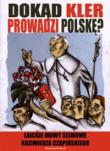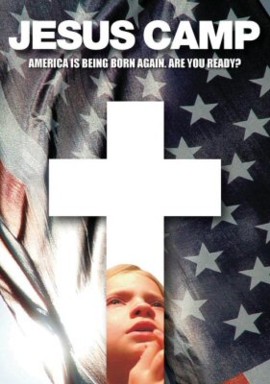
|
Kultura » Sztuka » Filmy i filmoznawstwo Jesus Camp: A Children's Boot Camp for the Culture Wars
A mountainous woman of indefatigable good cheer, Ms. Fischer makes no bones about her expectation that the growing evangelical movement in the United States will one day end the constitutional ban separating church and state. And as the movie explores her highly effective methods of mobilizing God's army, that expectation seems reasonable. Like the Jesuits, Ms. Fischer understands full well the importance of the indoctrination of children when they are most impressionable (under 13 and preferably between 7 and 9). The key to the movement's future growth is the dogmas of evangelical Christianity. She compares Kids on Fire to militant Palestinian training camps in the Middle East that instill an aggressive Islamic fundamentalism. The term war, as in culture war, is repeatedly invoked to describe the fighting spirit of a movement already embraced by 30 million Americans, mostly in the heartland. At Kids on Fire we see children in camouflage and face paint practicing war dances with wooden swords and making straight-armed salutes to a soundtrack of Christian heavy metal. We see them weeping and speaking in tongues as the Holy Spirit seizes them. And we see them in Washington at an anti-abortion demonstration. Filmed during the Senate confirmation of S.C. Justice Alito, Children's Boot Camp forthe Culture Wars visits a church at which the congregation prays in front of a life-size cardboard cutout of President Bush. Justice Alito's eventual approval is hailed as another step forward in the movement's eventual goal of outlawing abortion, the No. 1 issue on its agenda. The majority of the children in „Jesus Camp" are home-schooled by evangelical parents who teach them creationism and dismiss science. Handsome 12-year-old Levi, who wears his hair in a mullet, is being groomed as a future evangelical preacher. Already exuding star quality, he strides through a group of children, waving his arms and mouthing dogma about how his generation is so important. Pretty 10-year-old Tory speaks earnestly of dancing „for God" and not „for the flesh." Nine-year-old Rachael is already an evangelical recruiter who fearlessly approaches adult strangers. Ms. Fischer speaks of „dead churches" (traditional Protestant churches in which the congregations sit passively and listen to a sermon) and declares these are places that Jesus doesn't visit. In evangelical churches where people jump, shout, weep and speak in tongues, she contends, the spirit is present. The great-unanswered question is what will happen to these poised, attractive children when their hormones kick in and they venture beyond their sheltered home and church environments. „Jesus Camp" includes one articulate and alarmed dissenting voice: Mike Papantonio, a talk show personality for Air America. A self-professed Christian of the dead church variety, he engages in a pointed but friendly debate with Ms. Fischer when she calls in to his show. But the only moment of real tension occurs during a side trip to a megachurch in Colorado Springs where the preacher Ted Haggard, president of the National Association of Evangelicals (and a Bush friend), turns to address the camera in a tone of suspicion and hostility. It is the movie's only glimpse of the evangelical movement's ugly, vindictive side. „Jesus Camp" doesn't pretend to be a comprehensive survey of the charismatic-evangelical phenomenon. It offers no history or sociology and only scattered statistics about its growth. It analyzes the political agenda only glancingly, centering on abortion but not on homosexuality or other items. Because it focuses on the education of children, Ms. Fischer speaks of the evils of Harry Potter. But there is no analysis of Biblical teaching nor mention of „end times" or the rapture. Who would deny that the movement's surging vitality is partly a response to the steady coarsening of mass culture, in which the dominant values are commercial and the worldview is Darwinian in its amorality? Spread globally by television, the least-common-denominator brand of "secular humanism" — the evangelicals' perceived enemy — is indeed repugnant. It wasn't so long ago that another puritanical youth army, Mao Zedong's Red Guards, turned the world's most populous country inside out. Nowadays the possibility of a right-wing Christian American version of what happened in China no longer seems entirely far-fetched. „Jesus Camp" is rated PG-13 (Parents strongly cautioned). Its frank discussion of politics and religion is upsetting to liberal Christians not to mention us secular humanists. The message flies in the face of studies that show the inferiority of home schooling. The purpose is certainly inimical to the tolerance demanded by democracy. The agenda of Ms. Fischer reminds us of the same tactics that were practiced by Mussolini, Hitler and Stalin. It reflects the same attitude as expressed by Pope Pius XI in his encyclical on Education delivered in 1929: „Where education is considered, it is the right, or rather duty, of the State to protect with its laws the prior rights… of families over the Christian education of their offspring. As a consequence, it is the duty of the State to respect the supernatural rights of the Church over Christian education. From this it follows that the so-called neutral or lay schools from which religion is excluded are contrary to the fundamental principles of education." And it mirrors the diabolical voice of Hitler: "Universal education is the most corrodingand disintegrating poison that liberalism has ever invented for its own destruction." * Published in the 2006 November/December issue of the American Rationalist.
« Filmy i filmoznawstwo (Publikacja: 30-03-2008 )
str. 5809 |
|||||||||||||||||||||||||||||||||||||||||||||||||||||||||||||||||||||||||||||||||||||||||||||||||||||||||||||||||||||
| [ Regulamin publikacji ] [ Bannery ] [ Mapa portalu ] [ Reklama ] [ Sklep ] [ Zarejestruj się ] [ Kontakt ] Racjonalista © Copyright 2000-2018 (e-mail: redakcja | administrator) | ||



 "Extreme liberals who look at this should be quaking
in their boots," declares Pastor Becky Fischer with jovial satisfaction in
the riveting documentary „Jesus Camp." Ms. Fischer, an evangelical
Christian, helps run Kids on Fire, a summer camp in Devils Lake, N.D., that
grooms children to be soldiers in „God's army."
"Extreme liberals who look at this should be quaking
in their boots," declares Pastor Becky Fischer with jovial satisfaction in
the riveting documentary „Jesus Camp." Ms. Fischer, an evangelical
Christian, helps run Kids on Fire, a summer camp in Devils Lake, N.D., that
grooms children to be soldiers in „God's army."